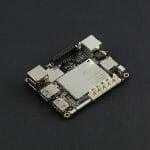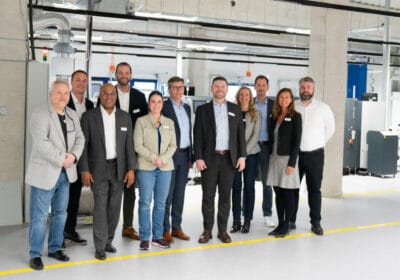The Manchester Fuel Cell Innovation Centre (MFCIC) – a £4.1m facility dedicated to developing new sources of green, emission free energy and making it available to as many people as possible – has officially opened at Manchester Metropolitan University.
The MFCIC will be at the forefront of hydrogen and fuel cell technology, which creates sustainable electrical energy through a chemical reaction between hydrogen and oxygen – with water as the only by-product.
The technology could power homes, offices, factories, cars and public transport – making them more efficient and not dependent on the main power grid.
Fuel cells have higher efficiency than diesel or gas engines, operate silently and the only waste product at point of use is heat and water. They can be used to store energy efficiently, which other forms of renewable energy currently struggle to do.
Researchers at MFCIC will share their expertise and £2.5m of dedicated specialist equipment with small and medium-sized enterprises (SMEs) across Greater Manchester – training them in this new technology so they can discover and utilise its commercial and environmental benefits.
The Centre was opened by The Rt Hon. Lord Mandelson, Chancellor of Manchester Metropolitan University.
He said: “Decarbonising our industries and creating a sustainable infrastructure is key to modernising the UK economy.
“This new centre at Manchester Metropolitan University will provide Greater Manchester with vital skills and tools in fuel cell technology, so that the region can play a significant role in the UK’s drive towards clean, renewable power.”
Professor Malcolm Press, Vice-Chancellor of Manchester Metropolitan University, said: “The Manchester Fuel Cell Innovation Centre will be a regional hub for research innovation and economic growth in the fuel cell technology sector. This is crucial both environmentally and economically for the region, as the UK focuses on increasing its use of renewable energy and lowering emissions.
“I am delighted that we will be making our expertise and distinctive capabilities in fuel cell technology available to industry, business and policy makers across Greater Manchester, transforming how we all power our homes, workplaces and vehicles.”
Amer Gaffar, Director of the Manchester Fuel Cell Innovation Centre, said: “There is currently huge investment in hydrogen and fuel cell technology, both nationally and globally, and this will continue to grow.
“Our collaborations with SMEs will open up the vast market opportunities that fuel cells can bring to Greater Manchester business and industry – ensuring that this green technology is adopted across the region.
“We are also excited about engaging with the public, educating people about the importance of producing sustainable energy and how hydrogen power can benefit all of us.”
MFCIC will produce advanced materials for fuel cells and next generation energy storage, utilising nanomaterials and 3D printing for example, and plan hydrogen and fuel cell infrastructure for the region.
Over the coming months, MFCIC will run workshops to show SMEs how they can improve efficiency and open up new market opportunities by collaborating with researchers and incorporating hydrogen and fuel cell technology.
MFCIC researchers will also educate the next generation about hydrogen power and the importance of ensuring an environmentally sustainable future, visiting Greater Manchester schools with its HySchools project.
The MFCIC will create teaching materials, practical lab investigations that can be shared across the platforms that schools use to teach the curriculum.
Manchester Metropolitan University was a founder of the Greater Manchester Hydrogen Partnership, and the centre will be the region’s lightning rod for research and development in the hydrogen power and fuel cell sector.
The centre was partly funded with £1.6m from the European Regional Development Fund, with the University providing the rest of the funds.








